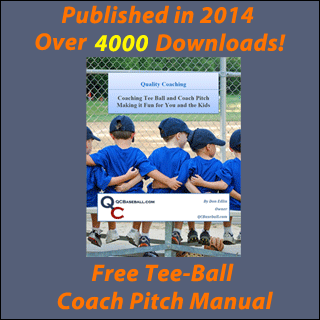Baseball Rules
Trying to make sense of a rule book can be a confusing proposition at best. In this section I'm going to try and present baseball playing rules in a manner that will hopefully make sense and be a little less confusing.
Disclaimer
While I will attempt to be as accurate as possible in describing the rules and the situations in which the rules are applied, this section is in no way intended to be used instead of the rule book. The purpose is to hopefully clarify some of the rules that maybe be confusing even after reading the rule book.
Remember, rules will vary by league and age group, so check your rule book to make sure it fits with what is stated here.
Feedback and Input
Baseball rules is a new section to the web site and will grow over time. If you are confused about a rule that isn't listed here (as of now that's most of them), please email me at don@qcbaseball.com and I'll try to add it to the section. If you know that a rule is different for a particular league, please let me know that also and I will add an annotation to the explanation listed here.
judgment of the Umpire
It's important to remember that most calls are based on the judgment of the umpire. You may see it one way and the umpire may see it differently. That's baseball, and missed calls are going to happen in every game. You want your players to be able to put bad calls behind them and continue to play hard and focused. It then makes little sense to argue a call in youth baseball over what the umpire has seen. Show your team that you respect the umpire and you can move on and focus on the next play. You'll be emulating what you're telling them and they will learn good sportsmanship along with developing an ability to play more consistently by focusing on things that are under their control. For example, if an umpire calls a player out on a tag play and you think the opposing player missed the tag, what's your argument? "Ump, you must be blind!" The fact is you have no argument and the umpire is not going to change his mind based on you saying "he missed the tag". It's a judgment call. You don't have to be happy about it, but you need to accept that bad calls are going to happen.
With that said, the one area where a call can be changed is when the incorrect call has been made based on the rules of the game. Most umpires know the rules inside and out, others in the younger age groups are new to umpiring and may not be aware of how a rule applies in a certain situation. If a rule is applied improperly, then there is a chance that the call can be overturned. It's still important to remember that most rules are based on the judgment of the umpire, so knowing a rule doesn't matter if the umpire didn't see it in a way where the rule would be applied. For example, if an umpire doesn't call an infield fly in a situation where you believe it should be called, you may tell him that it should have been called, but it's still a judgment call and can't be appealed. On the other hand, if the umpire calls "infield fly, batter is out", the ball drops in foul territory, and the umpire still states that the batter is out, then this is the incorrect call and you would want to tell (remind) the umpire that the infield fly rule only applies to a fair ball. By knowing the rules, you will know when you should approach an umpire to question a call and when you shouldn't.
In the Baseball Rules Section
Remember this section is just starting and will grow. So to start if off, I've picked a couple of rules that have come up a few times during games I've been involved in and have proved to be confusing for many people.
- 2. Definition of Terms
- Infield Fly Rule
- 5. Putting the Ball in Play, Dead Ball and Live Ball (in Play)
- Appeal
- 6. The Batter
- Hit by Pitch
- Outside the Batter's Box
- Dropped Third Strike
- 7. The Runner
- Appeal
- Overrunning First Base
- Running Lane to First Base
- Touching the Bases in Order and Retouching
- Tie Goes to the Runner
- Two Runners Occupying a Base
Most Recent Blog Posts
Working With Players on Focusing on the Correct Part of the Baseball when Hitting (October 15 2016)
Getting More Accurate Throws From Your Team (April 5 2016)
Had my first practice today and wanted to thank you for all the information on your site. I was nervous but your advice and info helped me get organized and the practice went really well. Thanks again!
- Jerry T.








